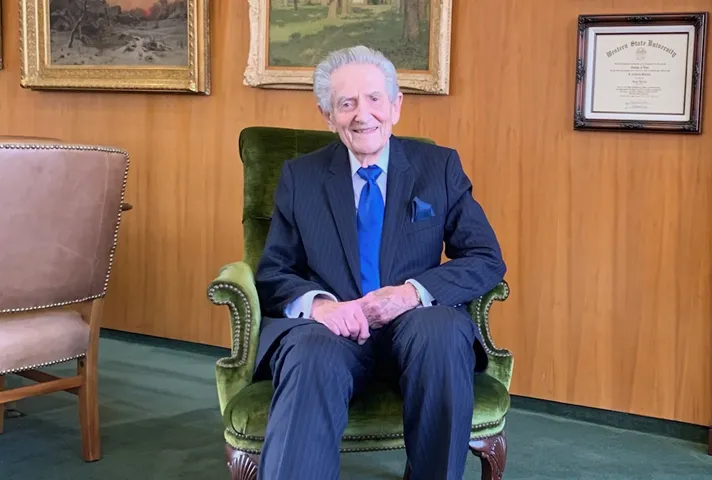
Judge J. Clifford Wallace, U.S. Court of Appeals for the Ninth Circuit. Credit: Daren Zhang, Law Clerk to Judge Wallace
Judge J. Clifford Wallace, a federal judge who has advised judiciaries in more than 70 countries during his half-century on the bench, has been selected to receive the 2022 Susan and Carl Bolch Jr. Prize for the Rule of Law. He will be honored during a ceremony in San Diego on March 18, 2022.
The award, instituted in 2019, is awarded annually by the Bolch Judicial Institute of Duke Law School to an individual or organization that has demonstrated extraordinary dedication to advancing the rule of law. Prior recipients include former U.S. Supreme Court Justice Anthony M. Kennedy; Margaret H. Marshall, former chief justice of the Massachusetts Supreme Judicial Court; and Dikgang Moseneke, former deputy chief justice of the Constitutional Court of South Africa.
“Few people have done more to build up and advise judicial systems around the world than Judge Clifford Wallace,” David F. Levi, director of Duke Law School’s Bolch Judicial Institute, said in a news release. “By emphasizing and supporting the proper functioning of courts and the effective and ethical service of judges, Judge Wallace has advanced the rule of law in substantial and remarkable ways.”
Wallace was appointed in 1970 to the U.S. District Court for the Southern District of California. In 1972, he was elevated to the U.S. Court of Appeals for the Ninth Circuit, where he served as chief judge from 1991 to 1996.
Judge Wallace “has had an enormous and positive effect on the administration of justice and promotion of the rule of law, both in the United States and throughout the world,” said Chief Judge Sidney R. Thomas of the Ninth Circuit. “His innovations in judicial administration have had a lasting impact, and the breadth of his accomplishments is simply astonishing.”
Wallace, who received the Edward J. Devitt Distinguished Service to Justice Award in 2005, continues to hear a partial load of cases at age 92.
As chief judge of the Ninth Circuit, Wallace created a long-range strategic plan for his circuit, and he established task forces to study gender and racial bias in the federal courts. His efforts were emulated in other federal circuits.
At the invitation of then-Chief Justice Warren Burger, Wallace helped create the American Inns of Court in the early 1980s, according to the Duke release. The Inns of Court involve nearly 30,000 judges, attorneys, and legal scholars in legal training and mentoring programs.
Wallace’s international work began in 1972, when he helped judges in the People’s Republic of China to form “economic courts” that would support international investment by establishing a more reliable legal network. In 1984, Wallace helped organize the Conference of Chief Justices of Asia and the Pacific, which continues to meet every two years. Wallace has helped courts in Africa to strengthen administrative processes, and in Guatemala, he helped create a mobile court system to ease access to the courts in remote, rural areas.
“Implementing the rule of law should be considered a worldwide project,” Wallace said in the Duke release. “By taking what we learn [from one judiciary] and adapting it to local conditions internationally, the prompt implementation of the rule of law becomes a worldwide goal.”
According to a 2020 article by the Ninth Circuit, commemorating his 50 years on the bench, Wallace said service, not fame or wealth, was the ultimate measure of a life.
“When we leave this mortal existence, we will not be long remembered,” Wallace said. “But our work, if done for the right reason, will hopefully have a positive influence on future generations.”
Asked what advice he would give to law school graduates, Wallace added, “Do not gauge your success as a lawyer by the amount of money you make. Your task is not only to represent clients, but also to help make our judicial system even more effective in properly defending the rights of all Americans.”
Subscribe to News Updates
Subscribe to be notified when the news section is updated.
